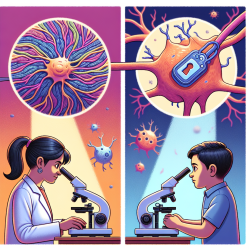Unlocking Potential: Embracing Genetic Insights for Neurodevelopmental Progress
In the ever-evolving landscape of special education, staying informed about the latest research and breakthroughs is crucial. As a Special Education Director, I am constantly seeking ways to enhance our educational strategies and support systems. The recent study titled "Pathogenic variants in SMARCA5, a chromatin remodeler, cause a range of syndromic neurodevelopmental features" offers valuable insights that can significantly impact our approach to supporting students with neurodevelopmental disorders.
The study identifies pathogenic variants in the SMARCA5 gene as a cause of a novel neurodevelopmental disorder. This discovery is a leap forward in understanding the genetic underpinnings of certain developmental delays and intellectual disabilities. The findings reveal that these variants can lead to mild developmental delays, postnatal microcephaly, short stature, and distinct facial dysmorphia.
Implications for Practitioners
For practitioners in the field of special education, these findings underscore the importance of genetic research in diagnosing and tailoring interventions for students with developmental challenges. Here are some actionable steps practitioners can take:
- Stay Informed: Regularly attend conferences, webinars, and read publications related to genetic research in neurodevelopmental disorders. This will keep you updated on new findings and their implications for educational practices.
- Collaborate with Geneticists: Establish partnerships with geneticists and researchers to better understand the genetic factors affecting your students. This collaboration can lead to more personalized and effective educational plans.
- Integrate Genetic Insights: Use genetic information to inform the development of Individualized Education Programs (IEPs). Understanding the genetic basis of a student's challenges can help tailor interventions that address their specific needs.
- Advocate for Genetic Testing: Encourage parents to consider genetic testing for their children when developmental delays are observed. Early identification of genetic factors can lead to timely and targeted interventions.
Encouraging Further Research
While the study provides significant insights, it also opens the door for further research. Practitioners are encouraged to engage in or support research initiatives that explore the following areas:
- Longitudinal Studies: Conduct long-term studies to understand how SMARCA5 variants affect development over time and how interventions can be optimized.
- Intervention Efficacy: Investigate the effectiveness of different educational and therapeutic interventions for students with SMARCA5-related disorders.
- Cross-Disciplinary Research: Collaborate with neuroscientists, geneticists, and educators to develop comprehensive support strategies that integrate genetic insights with educational practices.
By embracing these research outcomes and encouraging further exploration, we can enhance our ability to support students with neurodevelopmental disorders. This not only improves educational outcomes but also empowers students to reach their full potential.
To read the original research paper, please follow this link: Pathogenic variants in SMARCA5, a chromatin remodeler, cause a range of syndromic neurodevelopmental features.










